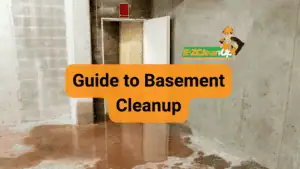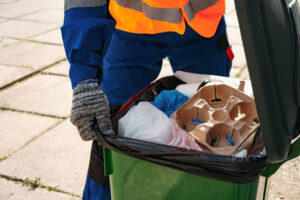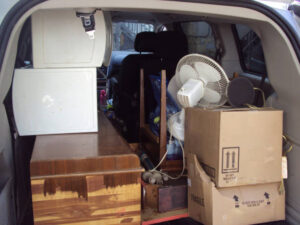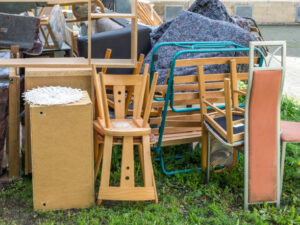Whether you’re renovating your home, managing a demolition project, or building from the ground up, construction debris removal doesn’t have to be overwhelming. Getting rid of construction debris doesn’t have to be a headache. With the right plan and disposal methods, you can keep your construction site clean, organized, and stress-free while staying compliant with local regulations.
Understanding Construction Debris
Construction waste accounts for over 600 million tons of debris each year in the US alone, making proper disposal more important than ever. Construction debris includes materials like concrete, wood, drywall, metal, asphalt shingles, bricks, and general renovation waste. The key to stress-free removal is understanding that construction materials and waste are not the kind of stuff you can leave out for your weekly trash pickup.
Plan Before You Build or Demo
Before beginning construction debris removal, proper planning helps prevent costly delays and safety hazards. Creating a waste management plan at the project’s start will save you headaches later. Consider these steps:
- Estimate your debris volume: Calculate approximately 1-3 cubic yards of waste per 100 square feet of renovation area
- Separate materials: Plan to sort waste into categories like wood, metal, concrete, and hazardous materials
- Check permit requirements: Review local building department regulations and neighborhood collection restrictions
- Research recycling options: Identify material-specific recycling services to reduce disposal costs
5 Stress-Free Disposal Methods
1. Rent a Roll-Off Dumpster
These containers come in various sizes, typically from 10 to 40 cubic yards, with most home renovations needing a 20-yard container. This is the most popular method for larger projects because it provides convenient on-site storage for all your debris. Rental periods usually span a week, though extensions are typical, and most companies handle the delivery, permits, and pickup.
Best for: Large-scale renovations, demolitions, and projects with substantial debris volume
2. Hire Professional Junk Removal Services
Professional services handle the entire process, with teams arriving ready to sort, load, and transport your construction debris, making this option ideal for busy homeowners or challenging removal situations. The hands-off approach eliminates physical strain and ensures proper disposal.
Professional services become essential when dealing with hazardous materials like asbestos or lead paint, and they’re also worth considering for large-scale renovations, multi-story debris removal, or when time constraints are tight.
Best for: Time-sensitive projects, hazardous material removal, and those who prefer a completely stress-free experience
3. Self-Haul to Transfer Stations
If you have access to a truck or trailer and live near a transfer station or landfill, hauling debris yourself can be cost-effective. You’ll need to check with your local facility to ensure they can accept it, and keep in mind that transporting might be difficult to handle on your own, especially if you have a large load of debris to haul.
Best for: Small projects, budget-conscious homeowners, and those with proper transportation
4. Recycle and Donate Materials
Recycling or donating materials can reduce costs while benefiting the environment. Many construction materials have significant recycling or resale value:
- Wood: Can be salvaged, sold, or donated if in good condition
- Metals: Steel, copper, and aluminum have high recycling value
- Concrete: Can be crushed and repurposed as aggregate
- Fixtures and appliances: Donate to organizations like Habitat for Humanity
Both local and national donation centers, like ReUse Centers or Habitat for Humanity, accept different types of materials commonly found on construction and demolition jobsites.
Best for: Quality materials in reusable condition and environmentally conscious builders
5. On-Site Material Processing
For projects with specific materials like concrete or wood, consider on-site processing. Many construction materials can be recycled or repurposed rather than sent to landfills; wood can often be chipped for mulch or biomass fuel, and even concrete can be crushed and repurposed as aggregate for new construction projects.
Best for: Large projects with homogeneous materials and those with sustainability goals
Handling Hazardous Materials Safely
Hazardous materials demand certified handling and disposal; asbestos removal requires licensed professionals to follow strict safety protocols, while lead paint materials need EPA-compliant containment methods, and these items must go to specialized disposal facilities.
Never attempt to remove hazardous materials yourself. Always hire certified professionals to ensure safety and compliance with environmental regulations.
Cost-Saving Tips
- Separate materials as you work: Mixed loads cost more to dispose of than separated materials
- Maximize recycling: Many recyclers accept materials for free or at reduced rates
- Compare dumpster rental companies: Disposal costs vary widely, from free donations to $800+ for weekly dumpster rentals.
- Salvage valuable materials: Sell or reuse items like fixtures, appliances, and quality lumber
- Plan for proper container size: Avoid overage fees by accurately estimating debris volume
Stay Compliant with Regulations
Most jurisdictions now require construction waste management plans for renovations, which typically specify proper handling of hazardous materials, minimum recycling requirements, and documentation of disposal methods. Check with your local building department about:
- Required permits for dumpster placement
- Minimum recycling percentages (often 50-75%)
- Documentation requirements
- Prohibited materials in regular waste streams
Key Takeaways for Stress-Free Debris Removal
- Plan early: Create a waste management strategy before starting your project
- Choose the right method: Match your disposal approach to your project size and timeline
- Separate materials: Keep recyclables separate from general waste
- Hire professionals when needed: Don’t risk safety with hazardous materials
- Track your documentation: Maintain disposal records for compliance
- Think sustainably: Prioritize recycling and donation when possible
Conclusion
Removing construction debris doesn’t have to be stressful when you have the right approach. Whether you choose a roll-off dumpster rental for convenience, professional junk removal for a hands-off experience, or a combination of methods, planning ahead is your key to success. Regular cleanup services help maintain site safety and efficiency, and removing debris progressively, rather than waiting until project completion, keeps workspaces organized and reduces accident risks.
By understanding your disposal options, following local regulations, and prioritizing recycling when possible, you can complete your construction project with minimal stress and maximum efficiency.
References
- The Green Dumpster – How to Get Rid of Construction Debris: https://www.thegreendumpster.com/dumpster/get-rid-construction-debris/
- 123JUNK – Dispose of Renovation Debris Right: https://123junk.com/blog/how-to-dispose-of-construction-debris/
- 1-800-GOT-JUNK – Construction Debris Removal & Concrete Disposal: https://www.1800gotjunk.com/us_en/what-we-take/construction_cleanout
- Dumpsters.com – How to Dispose of Construction Waste: https://www.dumpsters.com/disposal-guides/how-to-dispose-of-construction-waste
- U.S. EPA – Sustainable Management of Construction and Demolition Materials: https://www.epa.gov/smm/sustainable-management-construction-and-demolition-materials













